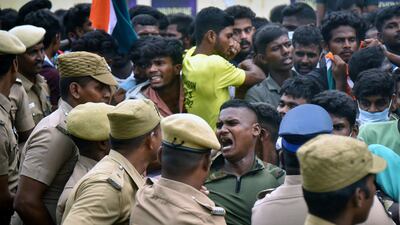Indian authorities increased security and issued prohibitory orders in several states on Monday after opponents of a new military recruitment scheme called for a nationwide strike.
This follows days of violent protests against the policy, which changes conditions of service for recruits.
Expectation of a "Bharat Bandh", as nationwide strikes are known locally, began mounting after the armed forces chiefs on Sunday defended the Agnipath — “path of fire” — scheme announced by Prime Minister Narendra Modi’s government and said the recruitment process would begin soon.
Would-be recruits are angry because Agnipath limits the term of service for non-commissioned ranks to four years, after which only a quarter are retained. The remainder are discharged with a one-off payment but no pension or other benefits.
The scheme also introduces a new age limit of 21 — an age many potential recruits have passed as intakes were suspended for two years due to the pandemic.
Protests erupted across as many as 10 states after the plan was revealed last week. At least one person was killed in clashes with police and dozens were injured.
The railway ministry on Monday cancelled more than 500 trains including 348 passenger trains, after dozens of railway carriages were torched during earlier protests.
More than 1,000 people have been arrested over the protests in Bihar and Uttar Pradesh — the two states that have the highest unemployment rate and send the most soldiers to the army.
As many 150 people associated with coaching centres for defence recruitment examinations have been arrested for allegedly inciting protests.
Mr Modi’s government has also banned 35 WhatsApp groups, accusing them of rumour-mongering and spreading fake news about the scheme.
The prime minister said on Monday that some government decisions looked "unfair" at first but would help in "building the nation" later, without making any reference to Agnipath.
"The path of reforms will take us to new milestones," Mr Modi said at a public event in southern Bengaluru city.
The government relaxed some recruitment rules and announced incentives to pacify protesters, but has refused to roll back the scheme, saying it was a “transformative” and “revolutionary step” taken after wide-ranging consultations.
Home Ministry Secretary Ajay Kumar Bhalla chaired a meeting with top police and state officials at the weekend amid calls for a nationwide strike on Monday.
In the southern state of Kerala, security forces were sent to arrest anyone engaged in violence and destruction of public property.
Authorities in the eastern state of Jharkhand shut schools and suspended exams, while police in the northern state of Haryana warned that “antisocial” activities would be filmed to identify those taking part.
Farmers in Haryana said they would block a main motorway in Haryana in protest.
Police in the New Delhi imposed strict checks on Monday to prevent protesters from entering the capital, causing massive traffic jams. Television footage showed thousands of vehicles stuck on arterial roads and expressways connecting the capital with satellite cities.
Opposition parties have likened the Agnipath policy to controversial farm laws introduced by Mr Modi's government in 2020 without consultation with farmers and agricultural experts. The laws were repealed after year-long protests by farmers.
Hundreds of thousands of workers of the main opposition Congress party plan to hold peaceful protests on Monday and meet President Ram Nath Kovind to demand the scheme's withdrawal.
“The scheme should first be discussed with youth and in Parliament, but before that, it should be withdrawn,” said Ajay Maken, a Congress leader.
Mr Modi’s government said the new age limit for recruits would give the armed forces a youthful profile.
The government plans to recruit 46,000 military personnel this year.
Military service has traditionally been considered a lifelong career in India, where government jobs are preferred for their stability and benefits.
The country’s unemployment rate had touched a four-decade high even before the pandemic.


